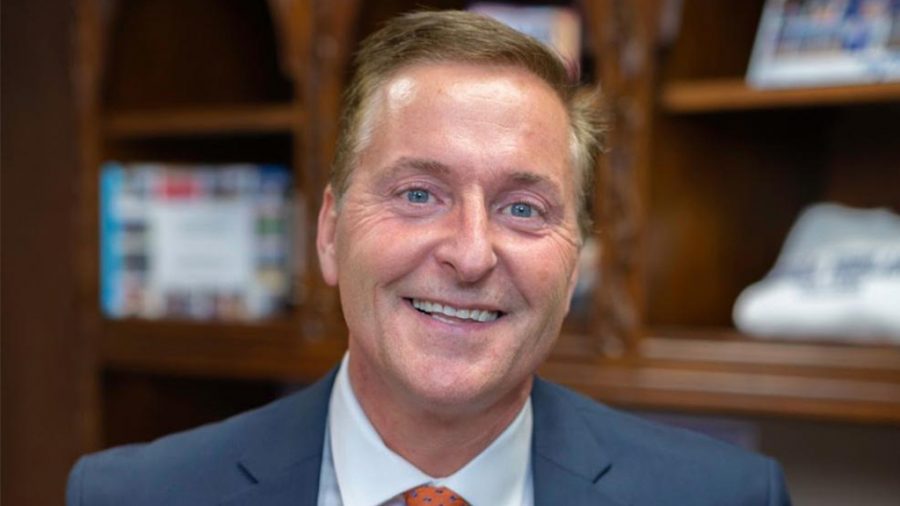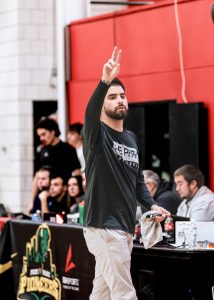President Don Green asks faculty, staff to wear name tags
President’s name tag announcement splits faculty
February 16, 2022
President Don Green announced via email that the university will be distributing name tags to faculty and staff — and the announcement has been met with mixed responses.
In an email first sent on January 27, President Green said the new name tags are part of an initiative to create a more “cohesive culture” on campus.
“As many of you know, one of my top priorities as president of Point Park University is to create a cohesive culture that benefits every member of our campus community. Making it easier to identify and engage with faculty and staff is an important way to support that effort,” Green said in the email. “To that end, the University will be providing name tags to our faculty and staff. We frequently pass each other in the halls or on the streets of campus and around Downtown, and my hope is that these tags will encourage faculty and staff to engage with and introduce themselves to each other.”
The name tags are expected to be distributed in the next few weeks. According to Green, the name tags are intended to help make university personnel more familiar with one another, which he believes will more strongly unite them. Instead, the announcement seems to have left them divided.
.
“I’m thrilled that the new administration is taking steps to improve our campus culture,” Mathematics Professor Matt Pascal said. “Granted, this is a small thing, but small changes with a positive effect are well worth taking.”
Pascal said he thinks that the name tag announcement is a change for the better and that it is indicative of the university taking genuine steps to improve the overall culture at Point Park.
“I think that culture change is hard and takes a long time,” he said. “It may take an accumulation of small gestures like this to get us there.”
While Pascal is among those supportive of name tags, not all of the university’s faculty are as favorable.
“My primary feeling is confusion,” Literary Arts and Social Justice Professor Karen Dwyer said. “As a teacher working with a student population who are struggling with significant academic and work challenges as well as with mental and emotional health, it feels like a priority that’s out of line with what I am seeing the students I work with need.”
Dwyer said she feels that if Point Park wants to change campus culture, name tags are not the most effective method to achieve that change.
“I don’t think name tags create culture,” she said. “I don’t think uniforms or pamphlets or any of the things that corporations use to brand themselves create culture. Culture is created by communities. You create culture by letting culture emerge in safe spaces where people feel free to be who they are. You create culture by offering the kind of institutional support students and faculty and staff need. You create culture by supporting the kinds of communities that the people that compose it want.”
Point Park has provided further clarification on the background and reasoning behind the name tag recommendation since the original email was sent at the end of January.
“When President Green was at Georgia Highlands College, they used name tags, and he found it to be a helpful tool for students, faculty and staff,” Managing Director of Marketing and Public Relations Lou Corsaro said.
The original email also stated that the name tags “will allow students to easily identify people who might be able to offer them assistance.” To that end, Corsaro said that the tags will include faculty’s respective titles so that students can identify their positions in the university, as well as other information that may be included.
“You can include your preferred first name only, or your preferred first and last name on your badge,” he said. “Additionally, you can enter your pronouns if you would like them to be visible. The person’s title also will be included.”
Finally, Corsaro confirmed that the name tags would be optional, so faculty and staff do not have to wear them if they do not want to.
“The name tags are suggested, not a requirement, but [President Green] hopes that most faculty and staff will take advantage of them,” he said.
However, some faculty have been clear on the point that they will not be wearing the name tags.
“I do not plan to wear a nametag,” Dwyer said. “I will not wear it — for reasons that range from the philosophical to the pedestrian: I do not feel safe letting every person know my name. I do not want every person to know my name.”
Other faculty members are more enthusiastic about wearing the name tags.
“I’m happy to. It’s not unusual for my students to forget my name, even this far into the term,” Pascal said. “I have to work hard to remember all my students’ names, so maybe you should all be wearing name tags, too!”
Although faculty responses to the announcement have varied greatly, there are still some things that they share a greater consensus on — namely by finding some humor in the announcement.
“Maybe I’ll get a really big one and wear it like a halo,” Pascal said. “Maybe it’ll be a marquee sign with flashing lights, I don’t know…”
Meanwhile, others have also drawn comparisons to a Seinfeld episode, “The Non-Fat Yogurt,” where then-mayor of New York City David Dinkins proposes a similar name tag proposal for the city that is met with a similarly mixed reception.
“I think most of us [faculty] went to that reference right away! So that echoes the responses that I have heard,” Dywer said. “Most of the faculty or staff that I have spoken with about this seem slightly bemused or confused by it. It feels like a strange priority in 2022. It feels like a dated priority to me.”
To those against the name tags, the Seinfeld comparison efficiently encapsulates their view of Point Park’s name tag initiative — a dated joke from a 30-year-old episode of a situational comedy that was intended to satirize public administrations attempting to apply easy but ineffective solutions to legitimate problems in an attempt to create the appearance of striving for the better while actually putting in as little effort as possible.
“I really think they believe it’s an easy way to create superficial cohesion,” Dwyer said. “I think it’s probably an easy, inexpensive way, short of uniforms, for a business to brand themselves. The cynic in me also sees it as an easy way for management to ‘see’ who complies.”
To those in support of the name tags, they represent a small, but legitimate, step toward a healthier and more hospitable campus environment that many have desired for years. Although the tags themselves are not enough to induce this change on their own, they open the doorway to allow more of this change to come in the future, as well as symbolizing a sincere effort to this end from the university administration that has long drawn criticism for its perceived lack of interest in producing such positive change.
“[Students] know what kind of relationship the previous administration had with the faculty, so it shouldn’t be a surprise when the new administration points it out each time they show us that times are changing,” Pascal said. “I totally get it, and maybe over time small things like this will go unannounced. But, for now I’m happy for them to emphasize it each time they take a step.”
Only time will tell how many faculty and staff will take up the name tags, like how Pascal intends to, and how many, like Dwyer, will not.
“The assumption of the nametags is that we are in person and on campus for our work,” Dwyer said. “And that those sacred minutes where I’ve chosen or carved out time not to be doing one of those things (when I walk to get a coffee, use a restroom, stand in a hallway, or gaze for a single moment to look out a window) is still a time that I could be recognized and expected to be ‘on’… well, that’s not something I am comfortable communicating to the world — even with something as small as a name tag. My name, my professional identity, and my relationship to this school, are still, I think, mine, and I believe I should be free to communicate those how I want.”




















